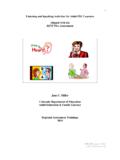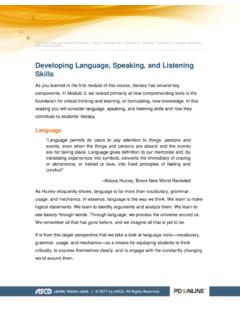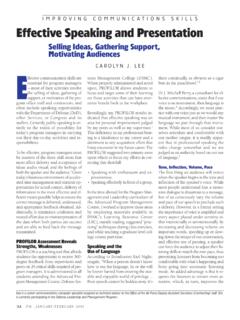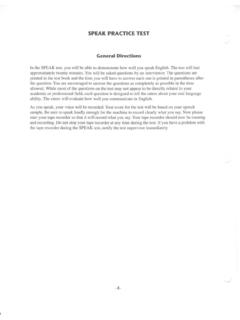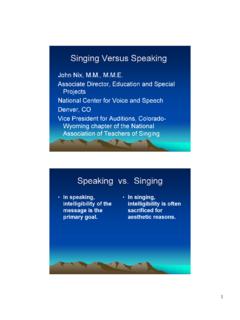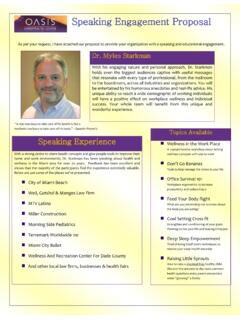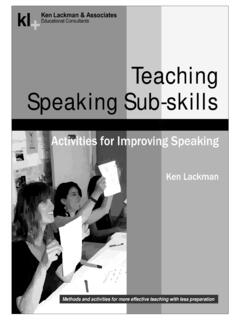Transcription of Public Speaking Workbook - Motivational Magic
1 Public Speaking Workbook Sam Walch, 1998 PDF created by Jumsoft, 2003 Sam WalchPublic Speaking WorkbookPDF created by JumsoftPublic Speaking Workbook Sam Walch, 1998 PDF created by Jumsoft, 2003 Table of ContentsSTEP 1 - The Communication ProcessExplore the basic process of communication and how an effective speakerunderstands this 2 - Selecting an Appropriate TopicThis step illustrates how to select a topic that is practical and 3 - A Purpose for CommunicatingBefore you start developing what you want to say, it's important to have a clear ideaof why you want to say itSTEP 4 - Researching Your TopicDiscover ways to gather information about your topic, and save yourself repeatedtrips to the 5 - Audience AnalysisProbably the most important tip for effective communication is to remain 6 - Formulating a Residual MessageMake sure that your audience remembers the important parts of your 7 - Developing Your Main PointsIdentify main ideas that you want to communicate and support them withappropriate evidence and 8 - Structuring Your SpeechOrganize your ideas for maximum 9 - Connectives, Conclusions, and IntroductionsMake good first and last impressions.
2 And connect your ideas so that they 10 - Visual AidsIncorporating visual aids into your presentation can help make a good speech into agreat 11 - Practice and DeliveryOne of the best ways to reduce communication apprehension is to rehearse Speaking Workbook Sam Walch, 1998 PDF created by Jumsoft, 2003 Step 1 The Communication ProcessIntroduction to the Communication ProcessIn its most basic form, communicating involves a sender who takes his/her thoughts andencodes them into verbal and nonverbal messages that are sent to a receiver. Thereceiver then decodes the messages and attempts to understand what the sender meant tocommunicate. The communication process is completed when the receiver transmitsverbal and nonverbal feedback to indicate his/her reception and understanding of process takes place within a context, also known as a rhetorical situation, whichincludes all that affects the communication process such as the sender-receiver's culture,the sender-receiver's relationship, the circumstances surrounding the sender-receiver'sinteraction, and the physical environment of the the basic communication process is the same in every situation, there are somesimilarities across all types of interactions.
3 Just the same, each interaction remainsdistinct and therefore each rhetorical situation will be example, think about how you communicate with another person in the library and ata party. In both cases you are sending messages and reacting to feedback. But the therhetorical situation of the library means that you will be Speaking in whispers, whereas atthe party you will be Speaking much louder and with more animated gestures. If you wereto switch styles--whispering at the party and yelling at the library--then yourcommunication style would be ineffective to say the least. In both situations you areengaging in the same communication process, but the rhetorical situations require you toact in different Communication Process and Public SpeakingBy focusing on the process of communication and the rhetorical situation, a speaker canmaximize the effectiveness of messages.
4 This means that an effective speaker doesn't"write" a speech in isolation and then simply stand up and deliver it. Instead, an effectivespeaker develops messages in relation to the situation, the audience, and thecommunication goals. Throughout the semester we will go into more detail about how todo this, but for now it is important to understand the following: Public Speaking Workbook Sam Walch, 1998 PDF created by Jumsoft, 2003 What the sender intends to communicate is not always what the receiver communication process can break down in any number of ways, and an effectivespeaker should not take the audience's understanding of messages for granted. Aneffective speaker makes sure to learn all that is possible about the audience and to adaptthe message to that audience.
5 "Actions speak louder than words."Non-verbal messages are usually believed more than verbal there is a conflict between nonverbal and verbal messages, the audience tends tobelieve the nonverbal. An effective Public speaker makes sure that the nonverbalmessages compliment and strengthen the verbal communication does not equal better 's the use of more communication if it is ineffective or bad communication? Aneffective Public speaker focuses on the quality of communication, not the an Effective ListenerListening is a vital skill, not only for this class but for life in general. Becoming aneffective communicator starts with becoming a better main thing to remember is that hearing does not equal listening. Hearing is aphysiological process that involves the reception of vibrations by the delicate structureswithin our ears.
6 Listening is a psychological process that involves the interpretation ofwhat we hear. Hearing is passive--it takes no effort on our part, while listening is active--it take effort and a willingness to tune of the most important parts of Public Speaking is learning how to listen to or readyour audience. This means being able to observe and to utilize the feedback from theaudience. Being a good listener also helps in the development of your speech because itallows you to gain skills in analyzing messages and retaining how do you start improving your listening skills? The key is to actively focus on yourlistening behavior, and to start eliminating behaviors that lead to poor listening. Thesenegative behaviors include: Mentally jumping to conclusions before the other person hasfinished Speaking Workbook Sam Walch, 1998 PDF created by Jumsoft, 2003 Focusing on how the person communicates rather than whatis being communicated.
7 Starting to think of a response before the other person hasfinished a aware of such behaviors, and actively trying to eliminate them is a major steptoward being a more effective ReviewBecoming an effective Public speaker starts with an understanding of the communicationprocess and the listening process. Even though the process of communicating is similar inall interactions, each specific situation will require you to make several choices abouthow to get your message Speaking Workbook Sam Walch, 1998 PDF created by Jumsoft, 2003 STEP 2 Selecting an Appropriate TopicIntroductionFinding a topic for your speeches can sometimes be a difficult process. A few of the mostcommon roadblocks to choosing a topic are: Trying to find a topic that will "blow the audience away.
8 " Trying to find a topic that your audience will like. Trying to find a topic that will make you look really problem here is that often a speaker worries more about conveying an "image" ratherthan conveying a message. In reality, such attempts at promoting an image usuallybackfire, so it is important to begin with the right a "Good" TopicIf you are having difficulty finding a topic, it helps to realize that it's not the topic thatmakes a speech effective. There are no "bad" topics, but there are inappropriate or poorlydeveloped topics. At this stage you should focus on choosing a topic: that you have some knowledge about, or wish to gainknowledge about; that you care about; and that is appropriate for the audience and the is especially important, because some topics simply don't work in aclassroom setting.
9 You should always strive to select topics that will not offend anymembers of the audience or promote harmful or illegal actions. In addition, avoid topicsthat the audience already knows Speaking Workbook Sam Walch, 1998 PDF created by Jumsoft, 2003 For example, the following topics have been so overdone that they will probably havelittle impact on your audience: Home Brewing The Benefits of Exercise Legalization of Marijuana or Hemp Fraternities or Sororities Throwing a Successful PartyIn addition, it's a good idea to avoid topics where your audience might have extremelypolarized opinions, like abortion or school prayer. The effectiveness of such speeches in aclassroom setting is often minimal. For example, if your audience agrees with yourviewpoint, then you are engaging in what's known as "preaching to the choir" --redundantly persuading those who are already persuaded.
10 Likewise audience memberswho disagree with you probably won't change their opinion based on a short speech,especially one that they are forced to sit , you should not avoid all controversial topics. Instead, you should consider thepreexisting attitudes of your audience when attempting to create an effective in doubt, always check about the appropriateness of a topic with your instructorwell in advance of your Speaking for Choosing a TopicHere's a technique for helping you choose a topic, called "Taking a Personal Inventory."By examining your existing knowledge and experiences, you can often find severalpotential topics. At this stage you shouldn't be too critical of your choices, but insteadshould be working on generating a number of possibilities.

